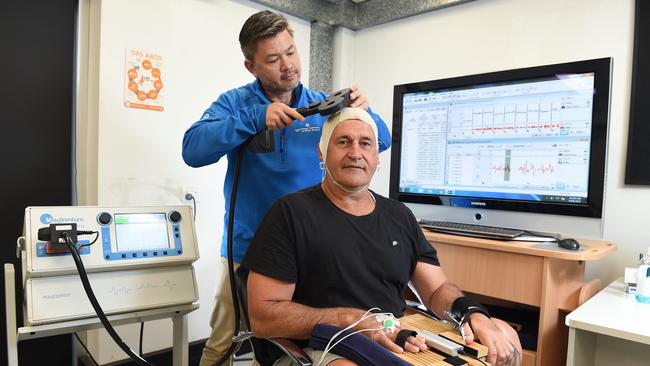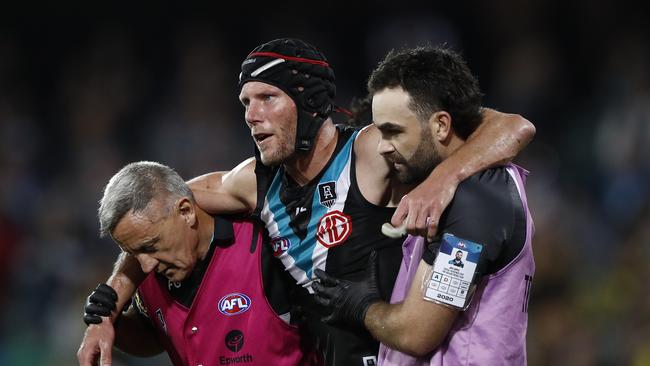Neuroscientist reveals alarming results from concussion study on retired VFL/AFL players
A leading neuroscientist has detailed his comprehensive concussion study, revealing widespread brain damage for retired VFL/AFL players.
AFL News
Don't miss out on the headlines from AFL News. Followed categories will be added to My News.
A senior neuroscientist from Australia’s sports brain bank says more than 80 per cent of the 162 retired VFL/AFL players he has tested were suffering from a form of brain damage.
Leading concussion expert Prof Alan Pearce told News Corp the remaining players all “showed some abnormalities when compared to age-matched healthy controls suggesting that their experiences in playing have affected their brains”.
The alarming revelation comes as Australia’s richest football code grapples with the scourge of concussion and repeated head knocks.
“Since 2012 I have studied 162 former AFL/VFL football players, who played between 1970 and 2015, as well as 25 amateur grade players,” Prof Pearce said.
Watch the 2021 Toyota AFL Premiership Season. Every match of every round Live on Kayo. New to Kayo? Try 14-Days Free Now >

“More than 150 were found to have impaired neurological functioning that matched their self-reported concerns around memory, mood problems and movement disorders.”
Tests on NRL players show similarly alarming results.
Prof Pearce said more than 73 per cent of the 33 retired NRL players he tested showed abnormal brain functioning compared to age matched healthy controls.
He tested men between the ages of 40 and 67, who had suffered between one and 30 diagnosed concussions in their careers — dating back 10 to 34 years since their last head knock.
Prof Pearce rejected suggestions his research was biased because the players he treated had already reported concerns.
“In order to answer this criticism, I recently conducted and published the biggest study on retired players to date comparing 83 athletes with ongoing issues such as memory, headaches, fatigue, mood disorders and movement problems to 39 athletes who reported no ongoing issues; with both groups compared with 50 age and educated matched healthy people with no history of playing contact sports,” he said.

“The athlete group with ongoing issues were significantly worse in their brain function than both other groups. However, what I found was that the group that did not report differences still differed in their neurological functions to the control group. Moreover, there were associations between the number of concussions reported and poorer neurological functions, irrespective of whether the player felt they had ongoing issues or not.”
Prof Pearce, of La Trobe University, has called for AFL players suffering heavy concussions to be sidelined for a minimum of 30 days.
“The recent AFL changes such as the 12-day stand down protocol are further examples of a PR campaign,” he said.
“These decisions are about being seen to do something rather than actually making sound decisions based on research or what is best for the athletes’ health and welfare and in the long-term the game more generally.”
Prof Pearce said his research “utilises a technique to measure neurological functioning by stimulating the brain and measuring the responses”.
“Players will come to see me and participate in my research because they have ongoing extreme fatigue, headaches, inability to focus or concentrate, sleep disorders, mood problems such as depression and/or anxiety, through to concerns including post-traumatic epilepsy, movement concerns that is eventually is diagnosed as Parkinson’s,” he said.
“The recent publicised cases of chronic traumatic encephalopathy (CTE) that we have seen have vindicated these studies which have shown evidence of neurodegeneration - things I don’t see in age and education matched people who have never played contact sports.
“Despite limited funding and support I am continuing my research. More studies are ongoing and I am calling for former footballers, and other athletes, who have had experienced concussions to participate in research irrespective of whether they feel they have ongoing issues or not.”
Prof Pearce said a 30-day hiatus would allow the human brain to “recover properly, so it reduces inflammation and the brain’s immune cells can repair the micro-damage”.
More Coverage
Originally published as Neuroscientist reveals alarming results from concussion study on retired VFL/AFL players




